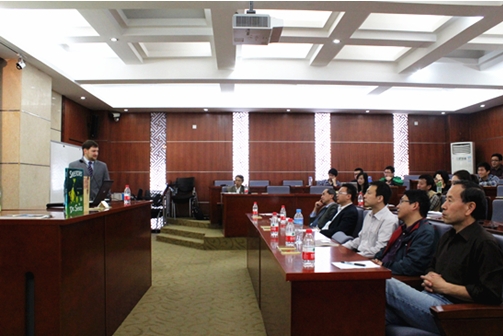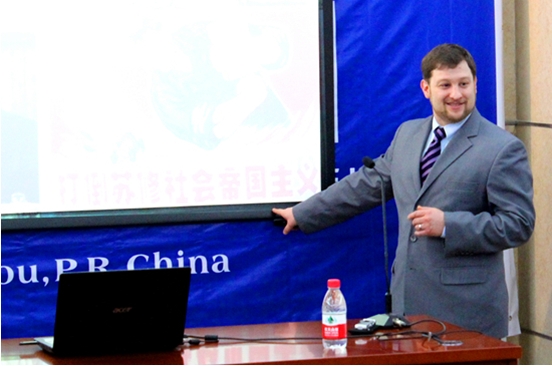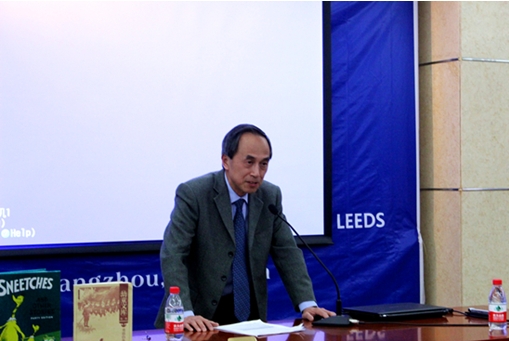On Mar. 27th, the 21stSession of Yunshan Academic Salon hosted by Guangdong Research Institute of International Strategies was held at B103 of No. 6 Building in GDUFS. The theme of the salon was “Sino-American Relations from the View of American Scholar” and the whole salon was divided into three parts, respectively expert lecture, expert debate and Q&A. Joshua Eisenman, senior research fellow in Chinese affairs of American Foreign Policy Council and Yu Bin, professor in politics of University of Wittenburg and senior research fellow of American Academy in Shanghai, gave gracious speeches.
Li Yongning, executive chief editor of International Trends, hosted the salon. Also presented were Prof. Tang Xiaosong, chief research fellow of GRIIS, Yang Shaogang, executive chief editor of Studies of Strategic Decision-Making, all the research fellows of GRIIS and postgraduates of Center for European Studies.

Joshua began his speech “Beyond Trust: A Modus vivendi for U.S.-China Cooperation” by explaining the Latin term “Modus vivendi”, whose English equivalent is “pragmatic approaches to problem-solving”. He challenged the traditional view by raising his point that mutual cooperation between China and America doesn't have to be achieved on the basis of trust.
He quoted the Zax and the fighting wolves, two domestically well-recognized children’s tales from the U.S. and China, to demonstrate fighting wastes energy and creates loopholes. “While you are both distracted and fighting among yourselves, larger threats will grow.” Both countries generally agree on the looming threats including militant Islamism, nuclear proliferation (DPRK, Middle East), climate change, environmental issues, human and drug trafficking. The possible outcome of confrontation, he pointed out, would be shared economic stagnation and catastrophe.
Recalling the past century, he concluded rather than the fruits of mutual trust, past U.S.-China successes occurred despite a lack of trust. Success occurred because progressive and forward thinking leaders on both sides placed tangible results above idealistic and intangible issues such as ideology and mutual trust. He urged rather than focus on trust, the U.S. and China ought to work to find creative approaches to align their mutual interests in order to achieve real results for the people of both countries.
“In the past 40 years, the Sino-U.S. relationship indeed deepened, broadened and become more complex. The relationship is interwoven and mutually dependent.” Prof. Yu regarded Sino-U.S. relationship as the most important bilateral relationship in the 21st century.

Joshua Eiseman Giving Lecture
Yu Bin delivered a speech titled “United States and China: Politics of Asymmetries”. He explained with abundant cases that how were Chinese and American people different in philosophy of life and understanding of political affairs. He put an emphasis on the role of perception, especially misperception, in political competition between countries.
Chinese people, he generalized as secular, backward-looking, enjoy slow motion (such as Tai Ji), study too much and are used to saving money; while Americans, on the contrary, are forward-looking, enjoy high speed, study too little (compared with Chinese) and are inclined to spending money.
People from China and the U.S. share very different view on political terms. He gave an example of “strategic”. The term is specifically conserved by Americans for “ally who is neither friend nor foe”; while Chinese use “strategic” to indicate an incident has great influence, as in “strategically important”.

After that, Joshua Eisenman and Yu Bin had a discussion over their speeches and answered questions from the audience. Li Yongning presented them with souvenirs on the behalf of GDUFS. It was such a brilliant academic feast that teachers and students of GDUFS had enjoyed.
Joshua Eisenman
Senior Fellow in China Studies
Joshua Eisenman is Senior Fellow in China Studies at the American Foreign Policy Council and editor of AFPC's China Reform Monitor. Along with Ambassador David H. Shinn, he is coauthor of China and Africa: A Century of Engagement (University of Pennsylvania Press, 2012). China and Africa, which was named one of the top three books on Africa for 2012 by Foreign Affairs, covers China’s political, economic, military and social relations with all African countries. Mr. Eisenman was also coeditor of China and the Developing World: Beijing's Strategy for the 21st Century (ME Sharpe, 2007) and author of the book’s chapter on China-Africa relations. In 2011-12, as adjunct professor of politics at New York University, he taught the international relations of China, Chinese domestic politics, and the political economy of East Asia both in New York and Shanghai. He is currently teaching China-Africa relations at UCLA
Prof. YU Bin Ph.D
Yu Bin is Professor of Political Science at Wittenberg University (Ohio, USA) and Director of Wittenberg’s East Asian Studies program. Yu earned his Ph.D. from Stanford University (1991) and MA from the Chinese Academy of Social Sciences (1982).
Yu’s professional activities includes: visiting scholar at the Center for American Studies, School of International Affairs and Public Policy, Fudan University in Shanghai (2006), Senior fellow of the Shanghai Association of American Studies (2002-current); faculty associate of the Mershon Center at Ohio State University (1991–current); visiting fellow at the Center for Asia/Pacific Research Center of Stanford University (1998); visiting fellow at the East-West Center in Hawaii (1994–95); President of Association of Chinese Scholars of Political Science & International Studies (1992–94); MacArthur fellow at the Center for International Security & Arms Control of Stanford University (1985–89); and research fellow at the China Center of International Studies, State Council, Beijing (1982–85).

